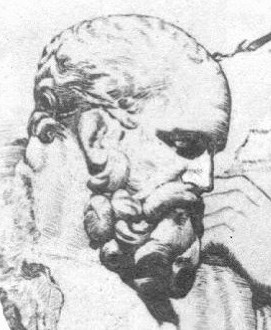Introduction | Life | Work | Books

Anaximander
(Detail from a frieze)
|
|
Anaximander (c. 610 - 546 B.C.) was an early Pre-Socratic philosopher from the Greek city of Miletus in Ionia (modern-day Turkey). He was a key figure in the Milesian School, as a student of Thales and teacher of Anaximenes and Pythagoras.
He was an early proponent of science, and is sometimes considered to be the first true scientist, and to have conducted the earliest recorded scientific experiment. He is often considered the founder of astronomy, and he tried to observe and explain different aspects of the universe and its origins, and to describe the mechanics of celestial bodies in relation to the Earth. He made important contributions to cosmology, physics, geometry, meteorology and geography as well as to Metaphysics.
Anaximander was born in the Greek city of Miletus (on the Ionian coast of modern-day Turkey) in about 610 B.C., the son of Praxiades, but little else is known of his life.
According to Diogenes Laėrtius (a biographer of the Greek philosophers, who lived in the 2nd or 3rd Century A.D.), he was a pupil of Thales (founder of the Milesian School of philosophy, and possibly also Anaximander's uncle), and succeeded him as master of the school, where his work influenced Anaximenes and Pythagoras.
Although he was among the earliest philosophers in the Western world to have actually written down his studies, only one fragment of his work remains and, by the time of Plato, his philosophy was apparently almost forgotten.
At a time when the Pre-Socratics were pursuing various forms of Monism and searching for the one element that constitutes all things (each had a different solution to the identity of this element: water for Thales, air for Anaximenes, fire for Heraclitus), Anaximander argued that neither water nor any of the other candidates can embrace all of the opposites found in nature (e.g. water can only be wet, never dry) and therefore cannot be the one primary substance or first principle of the universe.
He judged that, although not directly perceptible to us, the only substance which could explain all the opposites he saw around him, is what he called "apeiron" (variously translated as "the infinite", "the boundless", etc), an endless, unlimited primordial mass, subject to neither old age nor decay, that perpetually yielded fresh materials from which everything we perceive is derived. The Universe originates in the separation of opposites in this primordial matter, and dying things are merely returning to the boundless element from which they came. He saw the universe as a kind of organism, supported by "pneuma" (cosmic breath).
Anaximander is sometimes called the "Father of Cosmology" and the founder of astronomy for his bold use of non-mythological explanations of physical processes. He was the first to conceive a mechanical model of the world, in which the Earth floats very still in the center of the infinite, not supported by anything. He envisioned the Earth as a cylinder with a height one-third of its diameter, the flat top forming the inhabited world, surrounded by a circular oceanic mass. This theory allowed for the concept that celestial bodies could pass under or around it, and provided a better explanation than Thales claim of a world floating on water (what would contain this ocean?).
Anaximander was the first astronomer to consider the Sun as a huge mass (and therefore to realize how far from Earth it might be), and the first to present a system where the celestial bodies turned at different distances. He built a celestial sphere, and his work on astronomy shows that he must have observed the inclination of the celestial sphere in relation to the plane of the Earth to explain the seasons. Anaximander also speculated on the plurality of worlds, which places him close to the Atomists and the Epicureans who, more than a century later, also claimed that an infinity of worlds appeared and disappeared.
Some consider Anaximander the earliest proponent of evolution (even though he had no theory of natural selection). Noting the existence of fossils, he claimed that animals sprang out of the sea long ago, and he put forward the idea that humans had to spend part of this transition inside the mouths of big fish to protect themselves from the Earth's climate, until they had time to adapt to the emergence of dry land.
His other interests were in mathematics (he explained some basic notions of geometry and introduced the sundial gnomon to Greece), meteorology (he attributed some phenomena, such as thunder and lightning, to the intervention of elements, rather than to divine causes, and he explained rain as a product of the humidity pumped up from Earth by the sun) and geography (he was probably the first to publish a map of the world, i.e. the entire inhabited land known to the ancient Greeks, rather than the local maps which had been produced in ancient times).
See the additional sources and recommended reading list below, or check the philosophy books page for a full list. Whenever possible, I linked to books with my amazon affiliate code, and as an Amazon Associate I earn from qualifying purchases. Purchasing from these links helps to keep the website running, and I am grateful for your support!
|
|
